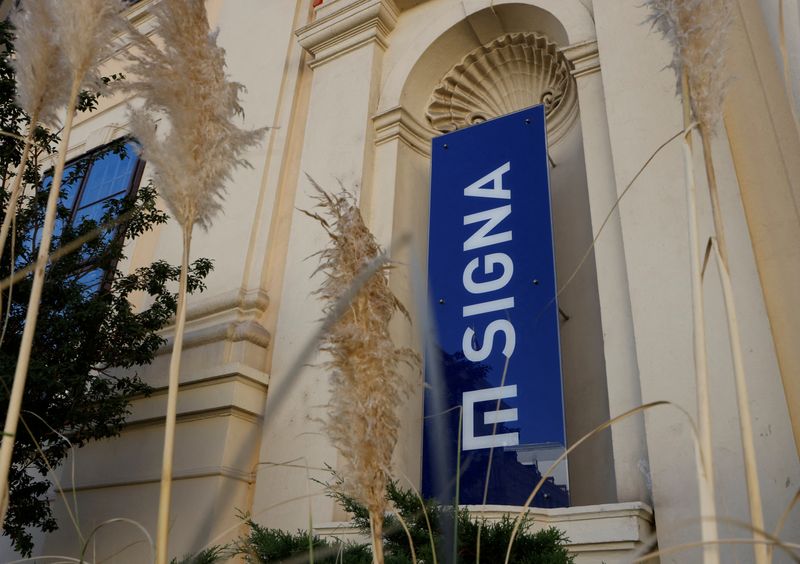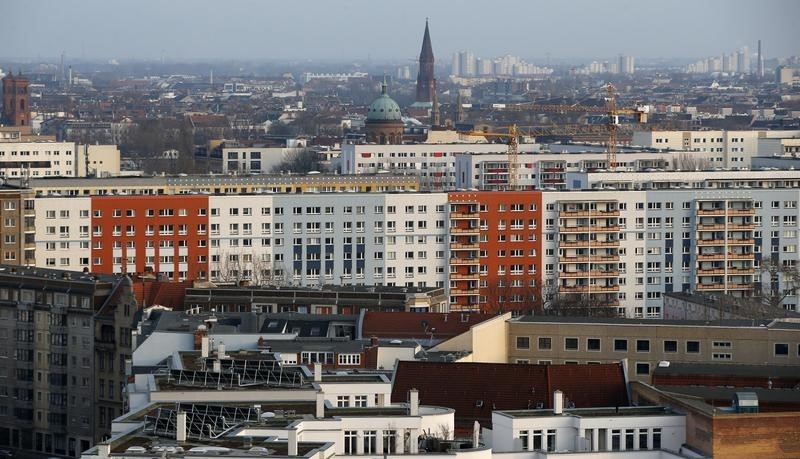By Alexandra Schwarz-Goerlich, John O'Donnell and Emma-Victoria Farr
VIENNA/FRANKFURT (Reuters) -Property and retail giant Signa declared insolvency on Wednesday after last-ditch attempts to secure fresh funding failed, making it the biggest casualty so far of Europe's property crash.
Controlled by Austrian magnate Rene Benko, the group is an owner of New York's Chrysler Building as well as several high-profile projects and department stores across Germany, Austria and Switzerland.
Signa Holding's debts amounted to around 5 billion euros, according to creditor protection associations KSV1870 and Alpenländischer Kreditorenverband (AKV), with 42 employees and 273 creditors impacted by the proceedings.
The multi-billion-euro group, whose reach spans from Germany's best-known department store, Berlin's KaDeWe, to the country's top high-street chain Galeria and a skyscraper project, is set to send ripples across the continent's embattled property sector.
Austrian chancellor Karl Nehammer sought to play down the significance of the company's collapse. "What's really important is that all those who invested here, especially the banks, stay stable," he told journalists. "That's critical."
Research by analysts at Austria's Raiffeisen Bank International, one of Signa's biggest lenders, warned earlier this week that its difficulties could trigger a wider drop in commercial property prices if it started to offload properties.
Signa's holding company in Austria said it would apply to a Vienna court to begin insolvency proceedings, and start a reorganisation of the group.
"The aim is the orderly continuation of business operations ... and the sustainable restructuring of the company," it said.
Signa was majority owned and controlled by Benko, although a number of other wealthy individuals, including Austrian industrialist Hans Peter Haselsteiner, had smaller stakes.
The insolvency of the holding company is expected to cascade through the group, although one important subsidiary was still fighting to stay alive.
Last ditch investor talks to provide liquidity for subsidiary Signa Prime - in which Signa Holding is majority shareholder - are still ongoing, although these have only a small chance of success, a person close to the matter said.
Signa Prime Selection is the largest company in Signa's real estate division, with a gross asset value of 20.4 billion euros.
Other minority investors in the Prime division include German industry billionaire Klaus-Michael Kuehne, Germany's RAG foundation and France's Peugeot (OTC:PUGOY) family.
The unit focuses on investment in properties in prime inner-city locations in Austria, Germany, Switzerland and northern Italy.
The steepest rise in borrowing costs in the 25-year history of the euro has caused property prices to tumble in Germany, where much of the group's business is anchored.
"It will be a little bit of a rude awakening for investors as they do see the lags in monetary policy eventually catching on," said Aneeka Gupta, an equity strategist at investment manager WisdomTree.
Signa blamed its problems on external factors affecting its property business and pressure on high-street shopping.
Sven Carstensen of bulwiengesa, a property consultant, said Signa's vast property holdings in Germany in mostly central locations meant its insolvency could leave deep scars in the country's cities.
The group, which values its assets at 27 billion euros ($29 billion), is made up of numerous subsidiaries. JP Morgan estimated its liabilities at 13 billion euros.
Its insolvency leaves a trail of half-finished construction projects across Germany, including one of the country's tallest buildings.
HALTED CONSTRUCTION
Signa had been making steady progress on the planned 64-story Elbtower skyscraper in Hamburg, until it stopped paying the builder, who halted work. Construction has also stopped at five other Signa sites in Germany.
Dozens of banks, insurance companies and pension funds have over the years financed and invested in Signa companies, bond sale prospectuses and a Signa presentation seen by Reuters show.
Signa has borrowed heavily from banks, including Switzerland's Julius Baer, which disclosed that it had an exposure of more than 600 million Swiss francs ($678 million).
The financial links are especially strong in Austria, where Signa was founded and is headquartered.
Raiffeisen Landesbank Niederoesterreich-Wien, Raiffeisen Landesbank Oberoesterreich and Erste Group are also among the banks with exposures to Signa.
Earlier this month, one of Raiffeisen Bank International's executives, Hannes Moesenbacher, identified a 755 million euro exposure to a client, referring to Benko's group, according to a person with knowledge of the matter.
BayernLB and Helaba, the regional state-backed banks for two of Germany's most affluent states, Bavaria and Hesse, have each lent the group several hundreds of millions of euros, said people with knowledge of the matter.

The real estate sector was a bedrock of Germany's economy for years, accounting for roughly a fifth of output and one in 10 jobs. Fuelled by low interest rates, billions were funnelled into property, which was viewed as stable and safe until the latest spike in borrowing costs.
Weakness in commercial real estate in the United States, with offices still empty after the pandemic, and the struggles of major property developers in China have focused global attention on the sector.
